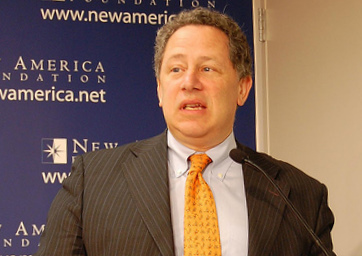
[digg-reddit-me]Although the conventional wisdom holds that blogging and the internet is leading us to become cretins who cannot compose full sentences (lest they run longer than 140 characters), there is reason for hope. And not just because Twitter and WordPress have made more prolific writers out of all of us. I have never read the news as intensely as I have this past years, so I cannot judge from even the limited perspective of my life, but there is some great prose written on blogs. I’ve found though, that when reading on a computer screen, I “read/skim” and don’t notice the finer sentences as I jump about the piece searching for the most interesting bits. However, I have taken to printing out substantial entries from blogs, and found much of the writing is in fact quite good.
One of the writers who has consistently drawn my attention with his witty aphorisms is David Rothkopf. His blog is well worth reading, for the insight, yes – but also for the wit.
In marriage, a lack of intimacy usually means you are not getting fucked… but in diplomacy, it means you almost certainly will be.
On the advantages America has over most other potential great powers:
We’re also protected by two great oceans and our neighbors are fairly easy to get along with. (Mexico is a bit of a concern at the moment but Canada lost its last remaining offensive capability when Wayne Gretzky moved to the United States.)
On Venezuela’s announcement of a nuclear program:
I’ve been predicting this problem for so long that it gives me a little lift even if it is a potential calamity for millions of others. Take note: that’s what narcissism makes possible.
On Eliot Spitzer’s desire for publicity:
The A.I.G. scandal and the collapse of Wall Street could have been [Spitzer’s] apotheosis, the moment the howling dogs of ambition in his breast might have finally gotten enough red meat of press exposure.
On the mania of the government for ensuring constant economic growth, specifically of GDP growth:
Didn’t our founders specify that the purpose of our country was to guarantee the right of all of us (well, white men anyway) to life, liberty, and the pursuit of constant growth in “the total market values of goods and services produced by workers and capital within a nation’s borders during a given period (usually 1 year).”
Commenting on GQ’s “50 Most Powerful People in Washington” edition:
If you follow Washington without losing your appetite, you’re not paying attention.
On the relationship between capitalism and Wall Street:
Because 21st Century Wall Street is to capitalism as Pope Alexander VI was to the teachings of Jesus Christ. There was a connection but it was remote and observed more in the breach than in the honoring of the essentially good underlying ideas.
On why Wall Street will finally be reformed:
Personally, I think they miscalculate. They finally may be undone by their greed. Except it won’t be because they stole too much or blew up the international economy. It’ll be because they stopped paying off the people who set the rules. And nothing puts a politician back in touch with his principles like a failure to keep up payments by the banker to whom he has mortgaged them.
Describing the dust-up between Kim Jong Il and Hillary Clintons:
No doubt drawing on his extensive training in rhetoric and stand-up comedy at the University of Malta (training ground for all of Malta’s best comics), Kim fired back with the tell-tale wit that once had him referred to as “the anti-factionalist Oscar Wilde of Baekdu Mountain” until someone discovered who Oscar Wilde was and the guy who invented the nickname was dropped out of a Russian helicopter into the Amnok River. (Wilde, meanwhile, might have called North Korean official efforts at humor “the unspeakable in pursuit of the unattainable.”)
Comparing America’s hegemony with Microsoft’s monopoly:
In the mid-90s, America and Microsoft were clearly the future of the world. Then both started to abuse their power. America, in the wake of 9/11, undercut the international system it built, rhetorically flaunted its hallowed values and then crudely and repeatedly undercut them in its behaviors. Microsoft went from a symbol of the garage-launched entrepreneurial energy of the tech revolution to being a ruthless crusher of competitors. In fact, it became so dominant, that it felt it could foist on the American public products that didn’t work, were full of bugs, were vulnerable to security breaches and, as in the case of Vista, should never have been released in the first place.
Defining the foreign policy precept, the law of the prior incident:
A reason for the swift action on Honduras is that old faithful of U.S. foreign policy: the law of the prior incident. This law states that whatever we did wrong (or took heat for) during a preceding event we will try to correct in the next one … regardless of whether or not the correction is appropriate. A particularly infamous instance of this was trying to avoid the on-the-ground disasters of the Somalia campaign by deciding not to intervene in Rwanda. Often this can mean tough with China on pirated t-shirts today, easy with them on WMD proliferation tomorrow, which is not a good thing. In any event, in this instance it produced: too slow on Iran yesterday, hair-trigger on Honduras today.
I had also accidentally included this Paul Krugman quote in the mix of Rothkopfian aphorisms – because it seemed so like something he’d say. Only on searching for the quote did I find its true author, but I’ll include it here anyway:
Serious Person Syndrome, aka it’s better to have been conventionally wrong than unconventionally right.
[Image adapted from a photograph by the New America Foundation licensed under Creative Commons.]






